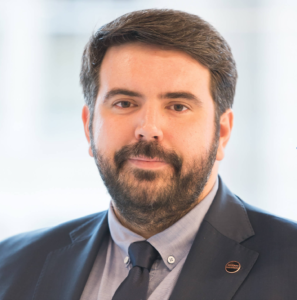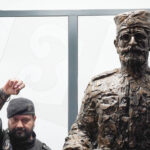Relations between Montenegro and Ukraine have a shorter history, but in the contemporary political moment they have gained importance that goes beyond bilateral frameworks. After Montenegro regained its independence in 2006, diplomatic relations were established with Ukraine, and in the years that followed, the policy of the then government of Milo Đukanović was fully aligned with the foreign policy of the West. Especially when it comes to relations with Ukraine, Montenegro, as a candidate for EU membership and a new member of NATO, has positioned itself as a reliable partner, condemning the annexation of Crimea, supporting the territorial integrity of Ukraine and joining all sanctions packages against Russia, regardless of previous ties and political and economic relations. In that period, foreign policy represented the strongest pillar of the international legitimacy of the Đukanović government, especially because its domestic dimensions – the fight against corruption, the rule of law and democratization – were significantly weaker.
After the 2020 elections, Montenegro entered a period of political instability and deep divisions, triggered by the mobilization of believers and supporters of the Serbian Orthodox Church against the Law on Freedom of Religion. In the processions that took place at that time, Metropolitan Onufriy, a pro-Russian church leader in Ukraine, played an important role, whose presence in Montenegro had both symbolic and strategic significance – as a link between the Moscow Patriarchate and the Serbian Orthodox Church, but also as a signal of spiritual and political orientation. The rhetoric of church leaders, especially Metropolitan Joanikije, often contained dangerous parallels between Ukraine and Montenegro, portraying Montenegrin identity as artificial and projected, similar to Russian theses about Ukrainians as little Russians who betrayed the Orthodox brotherhood. It is no coincidence that certain university officials, such as the current rector of the University of Montenegro, have publicly advocated positions that directly challenge Montenegrin statehood, using Ukraine as a threatening example of the West’s strategic intentions to sabotage Russian and Serbian spirituality.
With Russia’s all-out invasion of Ukraine in February 2022, the Montenegrin public has become further divided. Traditionally pro-Western and civic-minded Montenegrins have massively expressed solidarity with Ukraine – through protests, cultural events, and even institutional gestures, such as raising the Ukrainian flag on state institutions. On the other hand, the Serbian identity bloc, supported by the infrastructure of the Serbian Orthodox Church and its associated media, has organized rallies in support of Russia, spreading narratives about a „special military operation” and the fight against NATO. This division was not just symbolic – it represented a serious test of the consistency of the country’s foreign policy at a time when it needed strategic leadership the most.
Despite the change of government, Montenegro has until recently continued the practice of supporting Ukraine and respecting sanctions against Russia. However, as the influence of pro-Russian structures, personified in the figure of Parliament Speaker Andrija Mandić and his comrades from the former Democratic Front, grows stronger in the political life of the country, a shift towards a more „neutral“ tone is becoming more visible. This is particularly visible in the behavior of Montenegrin parliamentary delegations at European and international forums, which increasingly avoid direct condemnation of Russia or refrain from voting that require a clear value orientation.
The most powerful symbol of such foreign policy disorientation was the case of the announced visit of Ukrainian President Volodymyr Zelensky to Montenegro. The visit was originally planned for May 15, 2025, but the Ukrainian side requested a two-day delay due to upcoming negotiations in Turkey.
The announcement of Zelenski’s visit was accompanied by a propaganda campaign in the pro-Russian news outlet IN4S, which was founded by the rector of the Montenegrin University, Vladimir Božović. IN4S threatened with protests, and their reporter from the battlefield in Donbass, Igor Damjanović, spread established propaganda on his channels and in the Serbian media about Ukraine as a Nazi creation, calling Milatović and Spajić – who are close to the Serbian Orthodox Church in Montenegro – traitors.
Although President Jakov Milatović accepted the new date of the visit, Prime Minister Milojko Spajić suddenly canceled his participation, referring to previously undertaken obligations related to the enthronement of the Pope in Rome, which made Zelinski’s stay in Montenegro pointless, since the Prime Minister is responsible for signing the agreement. The media soon revealed that the enthronement was scheduled for a day later, on May 18, raising suspicions that it was a political maneuver and an avoidance of open support for Ukraine at a time when the ruling majority has expressed opposition to signing any formal agreement with the Ukrainian side.
Similarly, local media reported that Spajić repeatedly intervened with Montenegrin ambassadors in Ukraine, America and other Western countries, asking them to tone down their rhetoric regarding Ukraine and Russia. Such a move can be understood as an attempt to balance between formal affiliation to the Western bloc and internal political pressures from pro-Russian allies.
If we recall last year when it was announced that the candidate for Montenegrin ambassador to Moscow was a man who, in addition to his Montenegrin passport, also holds a Russian passport, whose father is an official of Rogozin’s extreme nationalist Rodina party, and who is a personal friend of Chechen leader Ramzan Kadyrov, all this takes on a different tone and dimension. Although the country’s president refused to give him credentials, the very proposal of such a person for such an important position speaks volumes about the state of the country’s foreign policy apparatus.
These tendencies were further confirmed by a recent statement by the Montenegrin chargé d’affaires in Moscow, who in his speeches and on social media praised Felix Dzerzhinsky, the founder of the Soviet repressive apparatus, and in public appearances in Moscow spoke of Russia and Montenegro as „two bodies and one soul.” This is a continuation of a narrative that attempts to symbolically reintegrate Montenegro into the Russian Orthodox world, using emotional and religious capital as a means of shaping foreign policy.
The conclusion that emerges is that Montenegro is in the process of creeping reorientation – not through explicit decisions, but through symbolic withdrawal, personnel choices and diplomatic passivity. The pressure of the Serbian Orthodox Church and its network, with the help of political partners from the Democratic Front, is increasingly shaping the discourse of foreign policy. Prime Minister Spajić, due to his own indecisiveness and desire not to threaten the parliamentary majority, is increasingly giving in to these pressures, which further weakens Montenegro’s position as a consistent partner of the West.
If this trend continues, Ukraine could lose Montenegro as a symbolic ally – at a time when any support is precious. Moreover, such a development could serve as a precedent for other states in the region that are flirting with the idea of neutrality, but are actually getting closer to Moscow. In this scenario, the Fico-Orban-Vučić regional axis could get another, albeit younger, partner – Montenegro, a country that was once considered an example of Euro-Atlantic integration in the Western Balkans.
Ljubomir Filipović. Montenegrin political scientist

The articles published in the “Opinions” column reflect the personal opinion of the author and may not coincide with the position of the Center



